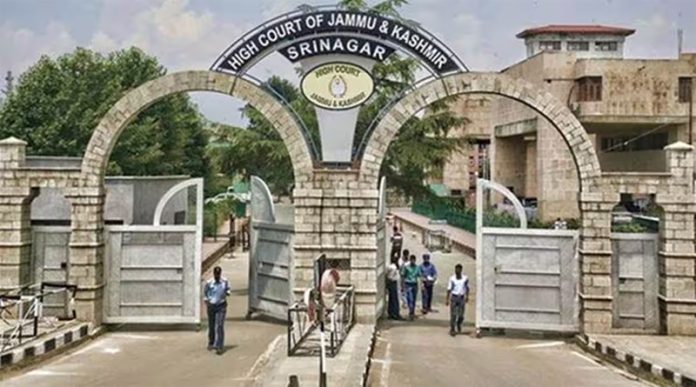‘Powers should be exercised as per statutes only’
Mohinder Verma
JAMMU, Oct 17: Deciding important question of law, High Court of Jammu & Kashmir and Ladakh has held that Appellate Authority by no stretch of imagination can infuse jurisdiction in the Designated Authority to act beyond the statutory provisions under Unlawful Activities Prevention Act (UAPA) and powers should be utilized strictly in the manner specified in the law.
The bench of Justice Wasim Sadiq Nargal was dealing with a petition filed by G M Bhat and his son Mohsin Mahuf Bhat of Hyderpora in Budgam district of Kashmir valley challenging the orders passed by Designated Authority under Unlawful Activities Prevention Act (Divisional Commissioner Jammu) and Appellate Authority (Sessions Judge Udhampur) respectively.
Advocate M A Qayoom appearing for the petitioners submitted that while the Designated Authority passed order confirming the seizure of the property of the petitioners for allegedly being proceeds of terrorism without considering the representation of effected persons, the Appellate Authority remanded the case back to the Designated Authority for reconsideration without any such provision in the law.
After hearing counsel for the petitioners and perusal of record, Justice Wasim Sadiq Nargal observed, “Section 25 of the Unlawful Activities (Prevention) Act, 1967 provides a complete mechanism with respect to the powers of the Investigating Officer, the Designated Authority and the Appellate Authority against the order of the Designated Authority”.
From a bare perusal of Section 25(3), it is manifestly clear that the Designated Authority before whom the seized or attached properties are produced shall either confirm or revoke the order of seizure or attachment so issued within a period of 60 days from the date of such production, provided that an opportunity of making a representation by the person whose property is being seized or attached, shall be given.
On the other hand, under Section 25(2), the Investigating Officer is under an obligation to inform the Designated Authority within 48 hours of the seizure or attachment of such property. Thus, it is clear that both for the Investigating Officer and the Designated Authority, there is a prescribed period of limitation, which cannot be condoned, High Court said.
Similarly, Section 25(6) states that any person aggrieved by an order made by the Designated Authority may prefer an appeal to the Appellate Authority within a period of 30 days from the date of receipt of the order and the Appellate Authority may either confirm the order of attachment of property or seizure so made or revoke such order and release the property, Justice Nargal said.
“In the instant case, once the Appellate Authority has come to a conclusion that the order passed by the Designated Authority is without any reasoning, then the Appellate Authority ought to have exercised the power of giving a finding whether the seized property is proceeds of crime or not”, Justice Nargal said, adding “the Appellate Authority instead of acting in conformity with the provisions of Section 25(6), has remanded the case back to the Designated Authority for reconsideration and passing fresh order, which in a way tantamount to extending the period of limitation of 60 days provided under Section 25(3) of the Unlawful Activities Prevention Act, 1967, which is not permissible under law”.
High Court further observed, “there is nothing which prevented the Appellate Authority from deciding the matter on its merit, without having to shift the onus back on the Designated Authority, leading to a situation, where the statutory time limit is extended, de hors the statute”, adding “when there in a expressly prescribed time limit for the Designated Authority to render its decision within a stipulated time period of 60 days, Appellate Authority by no stretch of imagination can infuse jurisdiction in the Designated Authority to act beyond the statutorily prescribed time limit, even if it is by way of remand”.
Observing that Designated Authority has not recorded any reasons as to how the seized property represents the proceeds of terrorism, Justice Nargal said, “this court is of the opinion that in line with the scheme of the Act instead of remanding the matter back the Appellate Authority, while dealing with the matter on its merits, should have decided whether the property represents the proceeds of terrorism as defined in Clause G of Section 2 of the UAPA”.
Pointing towards judgments of the Supreme Court, Justice Nargal said, “it is a settled preposition that when law requires a particular thing to be done in a particular manner, the act has to be done in that manner only”, adding “the order passed by the Appellate Authority is in flagrant violation of the statutory provisions as envisaged under Section 25 of the Unlawful Activities (Prevention) Act, 1967”.
With these observations, High Court set-aside the order impugned dated 30.06.2009 passed by the Appellate Authority and remanded the matter back to the Appellate Authority to decide the appeal of the petitioners afresh, strictly in conformity with provisions of Section 25 of the Unlawful Activities (Prevention) Act, 1967.


